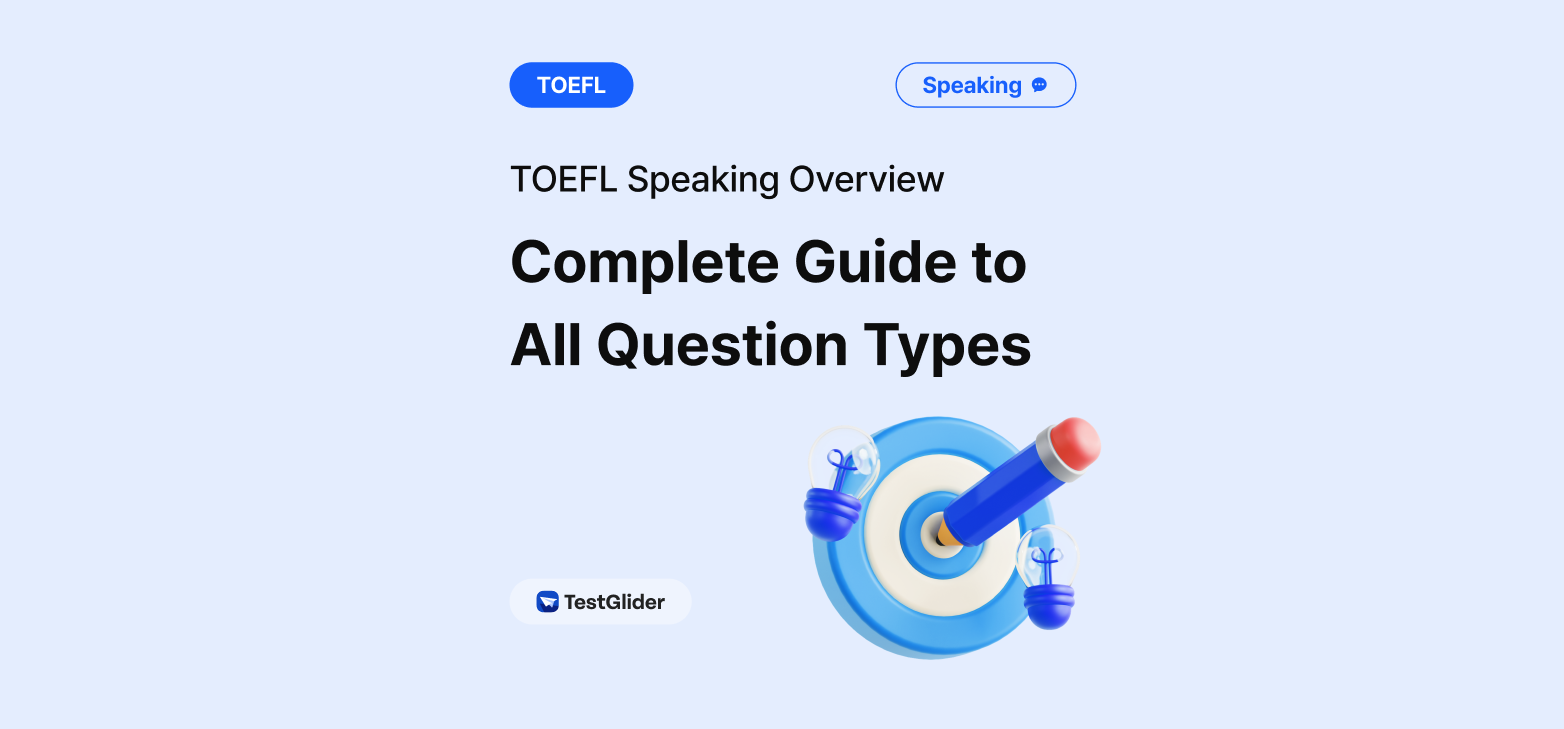Overview of the TOEFL Speaking Section (post July 2023)
The TOEFL iBT Speaking section has been optimized in recent updates to provide a more streamlined testing experience. Here’s what you need to know about the current format:
• Third section of the test (following Listening and Reading)
• 4 speaking tasks total
• About 16 minutes total
• Scored by AI and human raters
• Score range: 0-30 points
Two Types of Tasks – Independent & Integrated
The TOEFL Speaking section presents two distinct types of speaking situations. The section includes both independent tasks that test your ability to speak about personal experiences and opinions, and integrated tasks that assess your ability to combine information from multiple sources. This dual format evaluates both your spontaneous speaking abilities and your academic communication skills.
1. Independent Task (Task 1)
• Personal opinion or preference question
• Prep time: 15 seconds
• Speaking time: 45 seconds
2. Integrated Tasks (Tasks 2-4)
• Combines reading, listening, and speaking skills
• Prep time: 20-30 seconds
• Speaking time: 60 seconds
• Task 2: Campus Situation + Conversation
• Task 3: Academic Reading + Lecture
• Task 4: Academic Lecture Summary
4 Types of Speaking Questions
Let’s examine each speaking task type in detail, along with key characteristics and recommended approaches.
1. Independent Task (Personal Opinion)
What they test: Your ability to speak clearly and coherently about familiar topics.
Common question formats:
• “Do you agree or disagree with the following statement?”
• “Describe a person who has influenced you…”
• “What is your opinion about…?”
Strategy tips :
• Choose your position quickly
• Use personal examples
• Structure response with clear opening and conclusion
• Practice time management
2. Campus Situation Task
What they test: Your ability to understand and respond to a campus-related issue.
Common question formats:
• Reading passage about a campus change/policy (45 seconds for reading)
• Conversation presenting a student’s opinion
• You should summarize what you have read from the announcement and listened to from the conversation
Strategy tips:
• Take notes on key points from both sources
• Connect the reading and listening
• Clearly explain the relationship between sources
• Present information in logical order
3. Academic Reading + Lecture Task
What they test: Your ability to integrate information from academic texts and lectures.
Common question formats:
• Short academic reading (45 seconds)
• Related lecture that provides examples
• Explain how the lecture examples illustrate the reading concept
Strategy tips:
• Focus on main concept in reading
• Listen for specific examples
• Demonstrate clear connection between reading and lectur
4. Lecture Summary Task
What they test: Your ability to comprehend and summarize academic lectures.
Common question formats:
• Listen to a short academic lecture (about 1-2 minutes)
• Summarize main points and key details
• Explain relationships between concepts
Strategy tips:
• Take organized notes
• Identify main topic and supporting points
• Use academic vocabulary from the lecture
• Present information clearly and logically
Most Challenging Question Types and Study Tips
Based on extensive feedback from TOEFL test-takers worldwide, three speaking tasks consistently emerge as the most challenging. Understanding these challenges and implementing targeted strategies can significantly improve your performance.
The Academic Reading + Lecture Task proves particularly demanding as it requires managing multiple inputs simultaneously while organizing a coherent response. Test-takers often struggle with connecting concepts accurately under time pressure. To master this task, focus on developing efficient note-taking techniques and regularly practice combining information from different sources. Additionally, expanding your academic vocabulary and mastering transitional phrases will help you articulate relationships between concepts more effectively.
The Lecture Summary Task challenges test-takers with real-time comprehension and quick organization of academic content. Success in this task requires regular exposure to academic lectures and consistent practice in summarizing main points. Recording and analyzing your responses will help identify areas for improvement, while familiarizing yourself with common lecture patterns will enhance your ability to predict and organize information effectively.
Finally, while the Independent Task might seem straightforward, many test-takers find it challenging due to the strict time constraints and need for spontaneous organization. To excel in this task, practice with diverse opinion topics while timing your responses strictly. Developing response templates and building relevant vocabulary will help you speak more fluently and confidently within the time limit.
📚 Related Articles:
Looking to master other sections of the TOEFL? Check out our guides:
• Complete Guide to TOEFL iBT Reading Question Types (2024 Update)
• Complete Guide to TOEFL iBT Listening Question Types (2024 Update)
🎯 Ready to Master TOEFL Speaking?
Take TestGlider’s FREE TOEFL Practice Test and assess your current speaking level. Join thousands of test-takers who’ve improved their scores through our comprehensive practice materials.
[Start Free Practice Test →]

